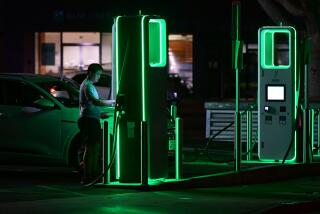Tough times are driving business at car repair shops
- Share via
When motorists’ pocketbooks are light, Bob Little’s wallet bulges.
The Culver City auto mechanic is busier than ever — booked solid, he said, for a week at a time — as Americans hold on to their cars longer, making repairs that in better times might have spurred a new vehicle purchase.
“We are busier than a son of a gun, and it’s stressful as all hell,” Little said as he leaned out the window of his wood-paneled office in the Ed Little Auto Service Inc. repair garage, named after his father.
Many auto repair shops flourished during the recession, according to industry statistics, benefiting as Americans pinched pennies. And as the U.S. vehicle fleet ages and consumers continue to save, repair shops, analysts said, are in a good position to continue their growth.
On a recent evening, Little scurried from aging cars to his office and back again, checking engines and fielding customer phone calls at his white-and-blue auto repair shop on Sepulveda Boulevard.
The 55-year-old mechanic said he’s making more costly repairs because his customers want to hold on to their cars longer.
“The past three years have been the best three years ever. The economy has not hurt me at all — at all. It has helped,” Little said. “People aren’t buying new cars. They’ll put a couple thousand dollars into a car before they buy a new one.”
Last year, auto repair garages in the U.S. reported $36 billion in sales, according to estimates from the Automotive Aftermarket Industry Assn. That’s up 10.5% from 2007.
This year, the auto parts trade group estimates sales for repair garages to jump nearly 5% from last year.
“There isn’t any big mystery here; people are opting for something they think is less expensive than a new vehicle and relying more on their older vehicles,” said Ron Pyle, president of the Automotive Service Assn., a trade group for repair shops.
That line of thinking is shared by Rebecca Lee of Diamond Bar.
The repairs on her 2000 Toyota Corolla are coming with increased frequency, the most recent being a $400 bill to replace a power steering pump and belt. But a new car, the Hollywood hotel concierge says, isn’t in the cards. The vehicle — with about 150,000 miles on it, will be around “until it dies,” she said.
“I figure it is more worth it to pay for a couple of repairs along the way instead of investing in a brand new car,” the 23-year-old said.
From 1999 through 2007, Americans purchased more than 16 million vehicles annually. But the number slid to just 10.4 million in 2009 and has rebounded only slightly. The industry is on track to sell about 12.5 million light vehicles this year.
Analysts said that consumers have delayed buying new vehicles because they are concerned about their jobs and the sluggish economy. That means there are more older cars on the road, and those vehicles require maintenance and repairs. The average age of a car in the U.S is now 11 years old, according to auto information company R.L. Polk & Co. The average light truck’s age is now 10.1.
But not all are benefiting from the uptick in old cars.
At MD Automotive in Westminster, owner Mark DiBella said business has been “a roller coaster ride” since 2008. After a busy early summer, business in August “just turned off” as the debt ceiling debate roared and the stock market fluctuated wildly, DiBella said. Sales are down this year compared with the same period in 2010, he said.
“People are just holding back spending any money,” he said.
Mitch Schneider, owner of Schneider’s Auto Repair in Simi Valley, said that although profit was up in August it is down for the year because he hasn’t passed on increased material costs to his struggling customers.
“Everybody is so tentative because nobody can get a handle on where it is going,” Schneider said, referring to the economy.
But Kathleen Schmatz, president of the Automotive Aftermarket Industry Assn., said if the economic bad news keeps rolling, independent repair shops may benefit.
That is unless things turn “real terrible,” she said, then it will be “bad for us all.”
“As long as it is just medium bad, it generally bodes pretty well for the repair shop,” she said.
Little, the Culver City mechanic, said his business didn’t slow in August despite dire headlines. The garage’s percentage of profit, revenue and volume have increased by double digits each year since 2008, he said.
“My only problem is getting the work done,” Little said.
Jim O’Neill, co-owner of Chino Autotech Inc., said sales have risen slightly throughout the recession and that August was up as well, pegging his good fortunes to Internet marketing coupled with consumers holding on to their cars longer to save money. O’Neill said he’s hired two part-time employees this year.
Aysha Wax of Encino is one of those keeping her aging car. Last month she said she spent about $500 for a new alternator and battery for her 7-year-old vehicle.
“I want this car to last, because I can’t afford another one,” the 24-year-old nonprofit worker and comedian said.
And another repair is coming soon. She said her fuel gauge is inaccurate because a part is broken, making her guess about when she is running low on gas.
But first, she said, she needs to earn the money to pay for it.
More to Read
Inside the business of entertainment
The Wide Shot brings you news, analysis and insights on everything from streaming wars to production — and what it all means for the future.
You may occasionally receive promotional content from the Los Angeles Times.








